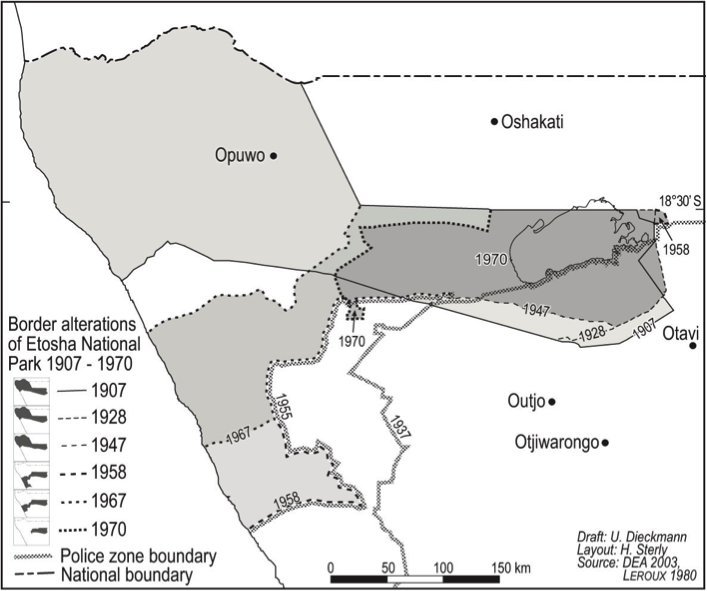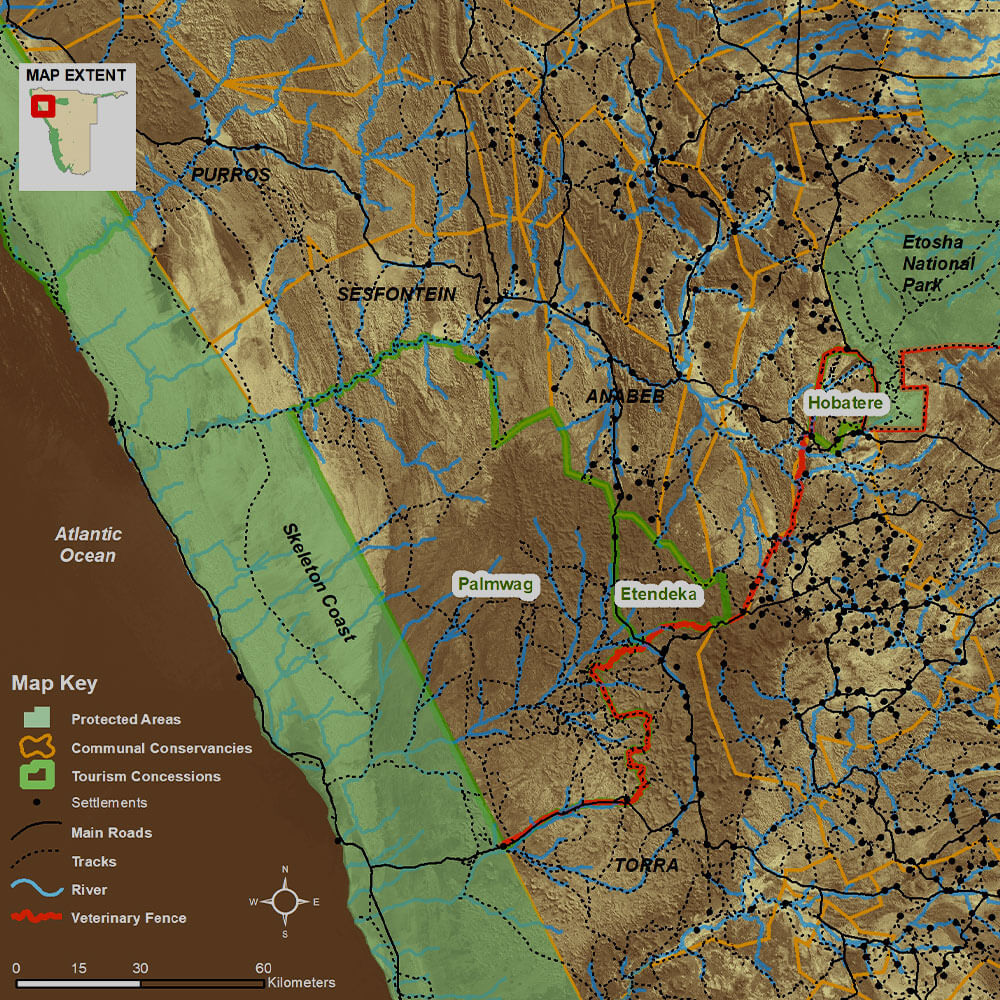Etosha-Kunene Histories
Historicising Natures, Cultures and Laws in the Etosha-Kunene Conservation Territories of Namibia
This cross-disciplinary humanities project proposes a multivocal and historical analysis that contributes new thinking on colonialism, indigeneity and ‘natural history’.
As clarified in the project summary, our aim is to support laws and praxis in biodiversity conservation to more fully recognise the diversity of pasts, cultures and natures constituting this internationally-valued region. An additional strand concerns natural history specimen-artefacts collected in Namibia by colonial actors to become housed in Museums beyond Namibia, and includes research in collections in Sweden, South Africa and the UK.
“Professor Sullivan’s cross-disciplinary project foregrounds the true value of collaboration across political and geographical boundaries, connecting past and present and placing people and the environment at its heart.
In-line with the combined UK Arts and Humanities Research Council and the German Deutsche Forschungsgemeinschaft initiative, the project highlights the need to continue transnational collaborative research with partners in Europe and around the world. It is through a truly global approach that much of the best research is realised.”
Professor John Strachan, Pro-Vice-Chancellor Research and Enterprise

The shifting boundaries of Game Reserve No. 2 / ENP, 1907–1970 (Source: Dieckmann, U. 2007 Hai||om in the Etosha Region: A History of Colonial Settlement, Ethnicity and Nature Conservation. Basel: Basler Afrika Bibliographien, p. 76, reproduced with permission).
Etosha-Kunene Histories is funded by the UK's Arts and Humanities Research Council (AHRC) and Germany's national Research Foundation (Deutsche Forschungsgemeinschaft - DFG), as one of 19 from more than 170 applications submitted in February 2019 to a new bilateral Humanities funding initiative of these research councils. It is built around international collaborations developed by the UK Principal Investigator Sian Sullivan, Professor of Environment and Culture at Bath Spa University with Dr Ute Dieckmann at the University of Cologne, and Dr Selma Lendelvo at the University of Namibia.
The project responds in particular to two UN Sustainable Development Goals. SDG15 aims to ‘ensure the conservation, restoration and sustainable use of terrestrial ecosystems’ (SDG15.1), in part through protecting globally agreed ‘key biodiversity areas (KBAs)’ – including Etosha National Park and Hobatere in Namibia’s Kunene Region. SDG10 aims for equitable development and reduced inequalities alongside political inclusion irrespective of differences such as sex and ethnicity (SDG10.2).
"It is an honour to be able to continue my long-term research in Namibia through the new collaborative Etosha-Kunene Histories project, which will allow me to sustain partnerships and collaborations developed over many years. The project exemplifies Bath Spa's strengths in Humanities approaches to environmental concerns, as brought together in the University's strategic Research Centre for Environmental Humanities.
In Namibia, colonial legacies of economic inequality combine with contemporary pressures around resource extraction, climate and environmental change, creating a heady mix of constraint and opportunity in the biodiversity and cultural heritage sectors. Heightened tourism and conservation values for the country’s apparently ‘pristine wilderness’ areas, and an associated romanticisation of indigenous lifeworlds, can in practice mask significant devaluation of real people’s diverse cultural perspectives and experiences.
Etosha-Kunene Histories will enable us to trace and disentangle these dimensions for a region of the world considered a global biodiversity and cultural ‘hotspot’. In connecting our historical and ethnographic research deeply with government and civil society organisations in Namibia, we hope to contribute to the country’s sustainability and justice agendas whilst also carrying out research with relevance beyond this geographical setting."
Professor Sian Sullivan
Project summary
- How can conservation of biodiversity-rich landscapes come to terms with the past (Vergangenheitsbewältigung), given historical contexts of extreme social exclusion and marginalisation?
- How can key biodiversity areas whose global value rests on ahistorical ideas of Nature resist an uncritical presentism, to be better understood as entangled with diverse human histories and values?
- How can conservation policy and practice recognise deep cultural and linguistic differences around ‘the nature of nature’?
Our research responds to the questions above through a cross-disciplinary humanities programme analysing dynamic dimensions of conservation territories in and beyond the Kunene Region of the former German colony that is now Namibia.
Etosha National Park and neighbouring beyond-Etosha conservation designations are home to diverse indigenous and marginalised peoples. Our research team of three women academics in Germany, the UK and Namibia has a combined 50+ years of ethnographic, archival, oral history and livelihoods enquiry in Etosha-Kunene.
We propose a new collaborative three-year programme of six intersecting work packages (WPs):
- WP1 on Historicising Socio-ecological Policy in Etosha-Kunene offers a detailed discourse analysis and history of public conservation policy affecting natures and peoples associated with the region, interrogating shifting influences, interests and governance technologies;
- WP2 on Comparative Indigenous Perspectives assembles our long-term research in the region into a new comparative analysis of indigenous Khoe, San and Himba-Herero understandings of natures-beyond-the-human, drawing on current theories in the anthropology of nature;
- WP3 on Making Identity and Indigeneity in Etosha-Kunene explores how indigenous identities are made, focusing especially on how distinct and intersecting ‘Khoe’ and ‘San’ identities have been present(ed) in ethnographic, linguistic, conservation and legal discourse;
- WP4 on Spatialising Coloniality in Etosha-Kunene (re)traces the thought and practices of selected colonial European actors from the mid-1800s, bringing their written narratives into conversation with indigenous interlocutors inhabiting the same places and spaces (see WP2);
- WP5 on Collecting, Curating and Returning Etosha-Kunene Natures investigates how the natures of Etosha-Kunene have been both represented and shaped by natural history collections of specimen-artefacts assembled by the European actors we study in WP4;
- WP6 focuses on public engagements, via a mobile exhibition, a website, a series of workshops and filmed documentations to share and further explore issues arising in WPs 1-5.
In sum, we offer a multivocal and radically historicised analysis of Etosha-Kunene that contributes new thinking on coloniality, indigeneity and ‘natural history’. Our aim is to support conservation laws and praxis to more fully recognise the diversity of pasts, cultures and natures constituting this internationally-valued region.
The collaborative website for this project is at etosha-kunene-histories.net. For more information please also see the blog article: Future Pasts and a new research project on Etosha-Kunene histories in Namibia. The project adds to the research portfolio of Bath Spa University's Research Centre for Environmental Humanities.
"Thanks to Professor Sullivan’s longstanding research ties with Namibia, Bath Spa University has been able to establish strong institutional links with the University of Namibia. Most recently, the University of Namibia joined the Global Academy of Liberal Arts (GALA), which was founded by Bath Spa in 2014.
GALA is an international community of diverse, innovative, and socially responsible universities and colleges whose aims are to transform lives and to enhance global understanding through interdisciplinary collaboration in teaching and research. Professor Sullivan’s new AHRC-DFG research project is exactly the kind of vital and important research that GALA is keen to facilitate and support.”
Professor Ian Gadd, Academic Director of the Global Academy of Liberal Arts (GALA)

Boundaries of current tourism concessions, surrounding communal area conservancies and state protected areas in southern Kunene Region, west Namibia. Source: Jeff Muntifering, 2 October 2019.
Funding success
Sian Sullivan, Professor of Environment and Culture in the School of Humanities and the Research Centre for Environmental Humanities has recently been awarded an Arts and Humanities Research Council grant to the value of £327,023 (fEC £390,098) for the project.
Public lecture
Professor Sullivan was due to speak about her research in a public lecture at the Holburne Museum on 25 March – this has been postponed due to COVID-19, with a new date to be confirmed.
Comments
Comments welcome: s.sullivan@bathspa.ac.uk.
Main image: Nathan ≠Ûina Taurob (R), Christophine Daumû Tauros (centre) and Michael |Amigu Ganaseb (L) greet and gift their ancestors and anonymous spirits of the dead, looking across the |Giribes plains towards their home area of Purros in west Namibia. Original photo by Sian Sullivan, May 1995. Composite image by Sian Sullivan and Mike Hannis, incorporating aerial photographs from the Directorate of Survey and Mapping, Windhoek.


